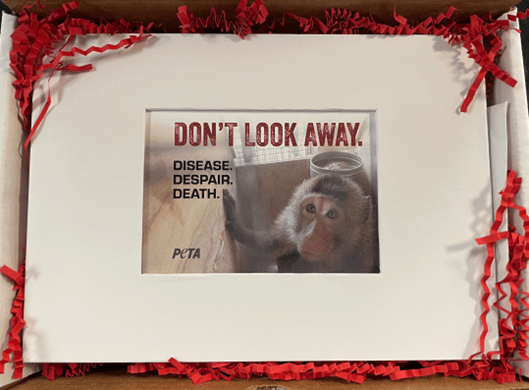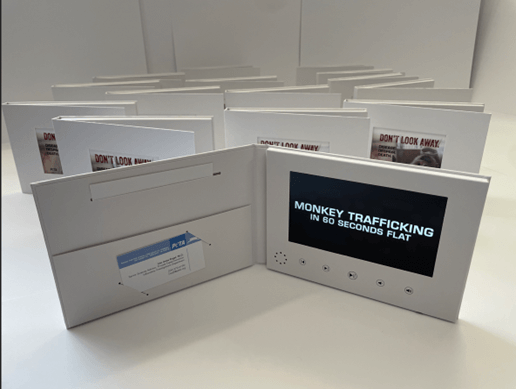Prime Minister Trudeau Receives Primate-Trafficking Video Card and Plea From PETA
For Immediate Release:
February 29, 2024
Contact:
Tasgola Bruner 202-483-7382
Prime Minister Justin Trudeau has received a greeting card with PETA’s shocking video Monkey Trafficking in 60 Seconds Flat” embedded in it as well as a letter urging him to act immediately to shut down the country’s involvement in the horrific primate-importation pipeline—beginning with monkeys who originated in Cambodia.

 Images of the video cards sent to Justin Trudeau and other Canadian government officials, which feature a long-tailed macaque destined for experimentation. Credit: PETA
Images of the video cards sent to Justin Trudeau and other Canadian government officials, which feature a long-tailed macaque destined for experimentation. Credit: PETA
Following the U.S. Department of Justice indictment of officials from Cambodia for alleged monkey laundering—illegally selling monkeys caught in the wild as captive-bred—the U.S. Fish & Wildlife Service has required importers to prove that monkeys imported from Cambodia were bred in captivity. Since then, primate importer Charles River Laboratories has circumvented this issue by bringing the monkeys to Canada instead. According to international trade data, shipments of monkeys worth CA$85.3 million were allowed into Canada from Cambodia after the indictments—an increase of 484% over the previous year.
Charles River Laboratories is the subject of federal, civil, and criminal investigations for possible violations of U.S. monkey-importation laws, and currently more than 1,000 long-tailed macaques it imported into the U.S. from Cambodia are in limbo.
“Charles River is profiting from monkeys whose origin can’t be confirmed, and Canada is letting the company get away with it,” says PETA primate scientist Dr. Lisa Jones-Engel. “PETA calls on Prime Minister Trudeau and other top officials to do better by monkeys and Canadian residents and get out of this deadly trade.”
Long-tailed macaques have been driven to the brink of extinction in part due to the international wildlife trade to laboratories like Charles River, which has facilities in Canada.
Importing monkeys also poses a grave and potentially fatal public health risk. Tuberculosis, a highly infectious disease that’s readily transmitted between monkeys and humans, is emerging in primate colonies globally. Monkeys from Cambodia have also been the source of a pathogen so deadly that the U.S. classifies it as a bioterrorism agent.
PETA’s video details how monkeys imported for experimentation are captured in nature or bred on squalid farms and how those who survive illness and injury are packed into small wooden crates and locked inside dark airplane cargo holds on the first part of their days-long journey to their final destination—laboratories, where they’ll be poisoned, mutilated, and killed.
PETA also sent cards and letters to media outlets, officials from the Canadian Food Inspection Agency, and Steven Guilbeault, the minister of environment and climate change.
PETA—whose motto reads, in part, that “animals are not ours to experiment on”—points out that Every Animal Is Someone and offers free Empathy Kits for people who need a lesson in kindness. For more information, please visit PETA.org or follow the group on X, Facebook, or Instagram.


